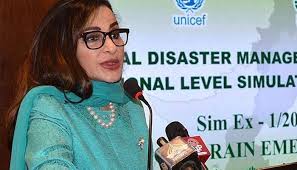Senator Sherry Rehman Calls for Revival of Bandung Spirit to Meet Global Challenges

Karachi, Vice President of the Pakistan People’s Party (PPP) and Parliamentary Leader in the Senate, Senator Sherry Rehman delivered the keynote address at the Pakistan Institute of International Affairs (PIIA) conference today, marking the 70th anniversary of the historic Bandung Conference under the theme “Seventy Years After Bandung: The Struggle Continues.”
Reflecting on the enduring significance of the Bandung ideals, Senator Rehman said, “Pakistan is proud to have stood at Bandung’s birth—and remains committed to its spirit 70 years on.”
She recalled how, in 1955, leaders from 29 newly independent Asian and African nations representing 1.5 billion people—more than 54% of the world’s population at the time—gathered to reject colonial domination and racial hierarchies.
“Bandung allowed half the world’s population to dream of a post-colonial future—where sovereignty was coupled with moral purpose.
Pakistan had a founding member’s skin in the game, with Prime Minister Mohammad Ali Bogra standing with Sukarno, Nasser, and Nehru, to call for a new global order freed from the imperial arrogance that had drawn cartographies of pain,” she said.
Shedding light on contemporary global challenges, Senator Rehman warned that the spirit of Bandung is under siege. “Today, we head into what could be a deeply divisive post-liberal future. Populisms and protectionisms are dismantling the fragile multilateral consensus that Bandung helped inspire.
The rules-based order is already in intensive care, with Gaza and Kashmir serving as tragic examples of selective justice.”
Addressing climate injustice, she pointed out that despite progress like the establishment of the Loss and Damage Fund at COP27, “$7 trillion are still going into subsidizing fossil fuels globally. Meanwhile, the nations least responsible for climate change—such as Small Island States—face existential threats.” She noted, “1/3rd of Pakistan was submerged in 2022 due to climate-driven floods, despite our emissions being less than 1%.”
Speaking about global inequalities, Senator Rehman cited alarming statistics: “The richest 1% of the world’s population controls nearly 50% of the world’s wealth, while over 700 million people, or 8.5% of the global population, still live in extreme poverty. According to World Bank, 60% of low-income countries are either in or at high risk of debt distress.”
She warned that “development gains can be wiped out through wars,” stressing that the world today is facing the highest number of conflicts since World War II. “We need the Bandung spirit to mobilize solutions across and within countries. Strategic patience and de-escalation must guide us—not the weaponization of resources like water.”
In this context, she strongly criticized India’s recent unilateral suspension of the Indus Waters Treaty, calling it “not just a regional provocation, but a dangerous violation of the international rules-based order.” She said, “India’s actions threaten to dismantle one of South Asia’s most important frameworks for transboundary water cooperation, and resurrect the very coercive practices that Bandung fought to end.”
Senator Rehman underlined the growing trust deficit between Pakistan and India: “Instead of reducing nuclear risks and working together on common challenges like climate stress and terrorism, India has ensured through its unilateral actions that the space for cooperation keeps shrinking. Strategic escalation and xenophobia are replacing rational diplomacy.”
Reaffirming Pakistan’s commitment to the Bandung ideals, Senator Rehman concluded, “Pakistan calls on all Global South nations to speak in one voice—for climate justice, economic equity, and a multilateralism that delivers.” Quoting Quaid-e-Azam Muhammad Ali Jinnah, she said, “Unity, Faith, Discipline are the building blocks of strength.
Let us apply those not just to our nations, but to our shared future.”
“Together, let us ensure that Bandung lives not only in memory, but in action.”
[9:27 PM, 4/26/2025] Shaf: Ministry of Foreign Affairs
(Office of the Spokesperson)
British High Commissioner Jane Marriott





